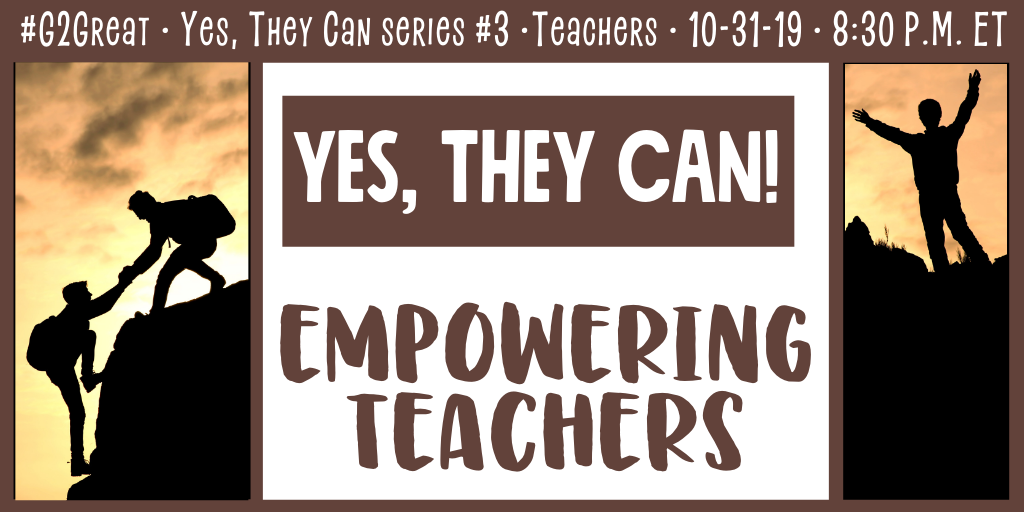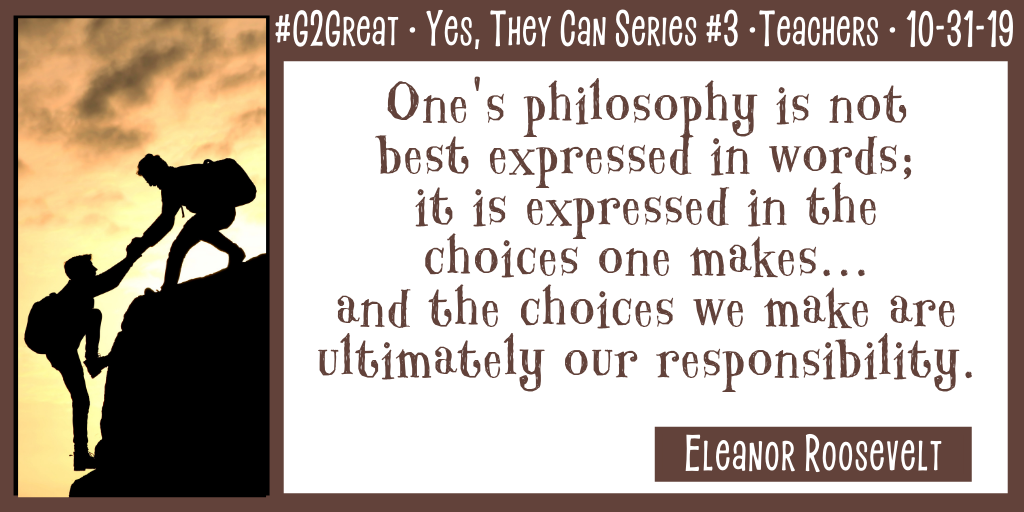by Mary Howard

On 10-31-19, #G2Great continued our five-part chat series, Yes, They Can! Following our first two chats on Empowering Students 10/17/19 and Empowering Student Voices 10/24/19, we turned our sights to Empowering Teachers. Judging by the inspired tweets, it’s apparent that our #G2Great chat family shares our deep passion for creating learning spaces where teachers can reside within a spirt of professional empowerment.

Before our #G2Great chat began, we shared the words of Eleanor Roosevelt that seem appropriate as I look back at our Empowering Teachers chat experience. This quote is a reminder of the impact teachers can have when given the freedom to take responsibility for their own choices. Professional decision-making driven by deep knowledge is the epitome of empowerment so it would seem that schools would want to nurture this idea, right? Sadly, that has not been the case in countless schools and districts that don’t seem to adhere to this wise proposition – a counter position to empowerment that is destined to shut the door on what COULD be.
Before we can ponder where we went so tragically awry in this professional decision-making quest, it makes sense to begin with a working definition that speaks to the heart of empowerment. To do this I turned to the wise words of Webster and friends:
Empower: to give or delegate power
Several synonyms support this succinct definition including: authorize, entitle, permit, allow, warrant, delegate enable equip with an antonym provided that says it all: forbid. With a little more searching, I found a definition closer to the meaning I was hoping for:
to make (someone) stronger and more confident, especially in controlling their own life and claiming their rights.
Certainly, confidence breeds action which increases empowerment while the opposite could also be said to be true: lack of confidence breeds inaction which decreases empowerment. I dug a little further until I found the perfect words deserving of a slide:

When schools believe in teachers as decision-makers, they endow them with the gift of empowerment. When that gift comes with a commitment to invest in teachers through professional learning, ongoing support and thoughtful resources – all things that could make a real difference in the lives of children – they bring that gift to life from one side of the building to the other. This happens when unwavering belief in teachers translates to viewing them as professionals deserving of trust. This is Empowerment.
But there has also been a sad flip side to this happy outcome. Districts and schools say that they believe in their teachers and the impact that they can have when they are empowered to make their own instructional decisions. Yet, their actions demonstrate empowerment lip service considering that in the same breath they dole out an endless array of mandates, computerized nonsense and out of the box scripted curriculum, all under the battle cry of “fidelity” as they tether teachers to a ball and chain of dictates. The reality is that professional empowerment will forever remain a myth perpetuated by misinformed task masters until we return professional decision-making to the hands of those who have the greatest potential to transform our learning spaces, decisions that may in fact include choosing not to follow mandated programs.
But this gift of empowerment does not come without a price. Trust implies that teachers will make responsible decisions based on the research that informs our beliefs about what matters most. This gift means that we are in turn willing to make the best possible professional choices in the name of children. Empowerment holds us accountable to assume the role of lifelong learner, opting to read professional texts and articles, attend webinars and other learning opportunities in a perpetual quest for growing knowledge. We engage in collaborative discussions in our schools or through social media. We ask curiosity-inspired questions. We seek understanding rather than hard and fast solutions. We take ownership of our responsibility to make the best decisions for our children rather than to simply reach for time-wasting activity fillers.
Of course, there is also a cost for districts or schools since we cannot empower our teachers unless we are willing to support professional learning opportunities across the entire school year. The only way that we can do that is to make ongoing professional learning our first priority. Yes, that comes at a financial cost but then we would have ample resources to this end if we refused to buy those fidelity fueled programs in the first place. See how that works?
Just last month I attended the International Literacy Conference in New Orleans and in two weeks I will be traveling to Baltimore MD to attend the NCTE Annual Conference. These are growth opportunities that I give myself every year and they always fuel my head and heart while sustaining me until I return again in a state of continual refilling. But year after year, the number of attendees at those conferences have slowly dwindled Why? Because many schools no longer invest in their teachers so that they too could attend these conferences. This demonstrates little value for the very learning that inspires and informs so many of us.
And let’s be clear about the so called financial problem that has become the go-to excuse for this travesty. We don’t have a money problem; we have a priority problem. The powers that be are perfectly content to sign a check to the tune of $500,000 or more for boxed curriculum and a staggering amount for one-size-fits-all skill and drill computerized junk. Yet they’re unwilling to invest in the professional knowledge. It is disconcerting that the investment in money hungry ploys are designed to summarily reduce teachers to market-driven puppets as we continue to waste precious dollars and minutes while demonstrating that we value things above people and the learning opportunities that could be the tipping point for real change.
Of course, our schools then insist that teachers want these things, but as a national consultant who spends a great deal of time with teachers across the country, I can tell you that most teachers want to take back the reins of decision-making that has been so cavalierly stolen from them. We fill their hands with out-of-the-box teaching and then wonder why some teachers beg for more. Why wold we be surprised when we have programmed a whole new generation of educators who want to live out their careers as the professional version of the Stepford Wives depicted in the movies. We have created our own reality and it has blinded far too many teachers, schools and districts to what is possible when we are willing to invite teacher empowerment into our learning spaces armed with the professional knowledge that fuels those choices.
As I come to the close of this passionate post, I think back to the words of John Spencer and A.J. Juliani in their wonderful book, Empower (2017 Impress, LP):
Changing the game of school means actually allowing students to create their own game. This is empowerment.
But I would argue that we will never change the game for our children until we change the game for our teachers. I’m going take the liberty of rewording the words of John and A.J. to make that point;
Changing the game of school means actually allowing teachers to create their own game. This is empowerment.

Thanks, as always, Mary for your important and thoughtful post. Directly connected to your thoughts on priorities is our national lack of an ongoing commitment to schoolwide, embedded, professional learning that leads to highly effective teaching and assessing for all learners–students, teachers, and leaders at all levels. A commitment to professional learning would, of necessity, include valuing attendance at esteemed literacy conferences. Sadly, until professional learning is prioritized, prescriptive programs will continue to disempower teachers.
Thank you for your wise words Regie. It always astonished me that we take the easy road and fail to even consider what would have a lasting impact. This is a powerful and yet tragic statement filled with so much truth, “Sadly, until professional learning is prioritized, prescriptive programs will continue to disempower teachers.”
Thank you for your wise words Regie. It always astonished me that we take the easy road and fail to even consider what would have a lasting impact. This is a powerful and yet tragic statement filled with so much truth, “Sadly, until professional learning is prioritized, prescriptive programs will continue to disempower teachers.”
Wow, Regie!
“. . . our national lack of an ongoing commitment to schoolwide, embedded, professional learning that leads to highly effective teaching and assessing for all learners–students, teachers, and leaders at all levels.”
national
lack of ongoing commitment
schoolwide
embedded
professional learning
that leads to highly effective teaching
and assessing for all learners
students
teachers
leaders
at all levels . . .
So many ways that this breaks down because it is so complex when professional learning is done well! 🙂